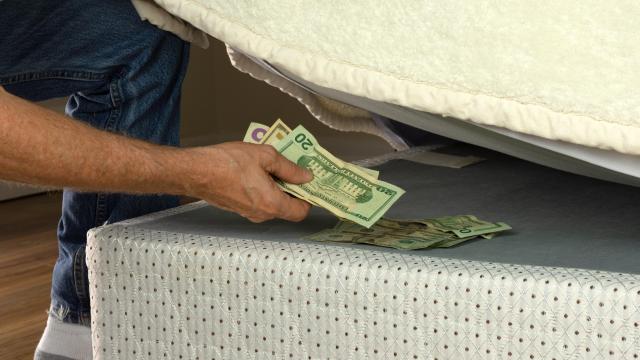Money is weird. Almost everyone in America thinks they’re middle class, which obviously can’t be true—but that underscores how broke most people are, even people who ostensibly make a good living. The fact is, 58% of Americans say they live paycheck to paycheck, which is bad, and 53% say they have exactly zero dollars in emergency savings, which is worse.
We should all have about six months’ worth of expenses socked away (though the actual amount of your emergency fund depends entirely on your actual needs), and that drive to save up for a rainy day usually starts with a savings account or two, someplace where you can park your cash that’s safe, accessible, and at least gestures vaguely at paying you interest. But plowing money into your savings account is only a good idea to a point—savings accounts are terrible investments, with the average interest rate well below half a percentage point, which is way below inflation. High-yield savings accounts often do better, but not by much—which means that while having a savings account is a good idea, you shouldn’t have too much money in one.
Missing out
Why is a fat savings account a bad idea? Look at those interest rates again: If you’re earning 0.5% on your savings, you’re actually losing money, because the current inflation rate is 3.7%. If you’re in a high-yield account you might be beating inflation for the moment, but those interest rates are going to change soon enough, and beating inflation by 1-2 points is still much less than the average 10% returns you’d get investing that money.
You should aim to have enough money in your savings account, but not too much money. So how can you tell you have too much?
Exceeding the limit
First, the easiest metric in the universe: If you are one of the rare weirdos who actually has more than $US250,000 in a savings account, you absolutely have too much money in your savings account. The Federal Deposit Insurance Corporation (FDIC) doesn’t insure individual deposits over that amount, so if your bank goes under, your money won’t be reimbursed and you’ll be left holding the bag. If you (for some bizarre reason) have that much cash parked in a savings account, it’s an absolute no-brainer to move it.
Know your needs
For most people, figuring out when you have too much money in your savings account starts with knowing how much money you need in that emergency fund. The six-month rule is a good start—figuring out your monthly expenses, multiplying by six, and making sure you have at least that much. But emergency funds are personal things, so yours might need to be bigger—a year’s worth of expenses, for example, or a higher amount to prepare for an upcoming expense.
Then add in any monthly savings goals, like saving for a down payment, or paying down debt. Add it all up and that’s your ideal saving account balance. For example, if your monthly expenses are around $US4,000 and you’re also saving for a vacation that will cost $US5,000, you’ll want about $US30,000 in your savings account—anything more would be better used in a higher-yield investment.
Aside from the total amount of cash in your account, the next consideration is time. If you’re not planning on taking that vacation for several years, leaving that $US5,000 in savings makes no sense—put it someplace where it will earn you some real interest in the meantime. In other words, anything you’re saving towards that’s years in the future (like retirement) shouldn’t be parked in a savings account. A good rule of thumb is to look ahead about one year. If you’re not going to need that money within a year, anything above your emergency fund goals should be put someplace else.
Of course, your individual needs will take precedence here—but always keep in mind that every dollar you have in savings is earning less than it would almost literally anywhere else.

Leave a Reply
You must be logged in to post a comment.